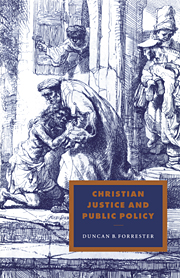Book contents
- Frontmatter
- Contents
- General editors' preface
- Preface
- Introduction
- PART I JUSTICE IN DISPUTE
- PART II POLICIES AND PRACTICES
- PART III THEORIES AND THEOLOGIES
- PART IV THEOLOGICAL FRAGMENTS
- 8 Lively and truthful survivals?
- 9 Love, justice and justification
- 10 Justice and community
- 11 The hope of justice
- Select bibliography
- Subject index
- Name index
- CAMBRIDGE STUDIES IN IDEOLOGY AND RELIGION
10 - Justice and community
Published online by Cambridge University Press: 02 November 2009
- Frontmatter
- Contents
- General editors' preface
- Preface
- Introduction
- PART I JUSTICE IN DISPUTE
- PART II POLICIES AND PRACTICES
- PART III THEORIES AND THEOLOGIES
- PART IV THEOLOGICAL FRAGMENTS
- 8 Lively and truthful survivals?
- 9 Love, justice and justification
- 10 Justice and community
- 11 The hope of justice
- Select bibliography
- Subject index
- Name index
- CAMBRIDGE STUDIES IN IDEOLOGY AND RELIGION
Summary
In earlier chapters I have argued that it is right to see justice as the first virtue of social institutions, but that ideas like fairness are too narrow to fulfil what is legitimately expected of justice. Justice is essential for a healthy social life; it is what binds people together in community, recognising a nexus of mutual obligations and responsibilities for one another. An acceptable degree of justice is necessary if people are to live together in harmony; a sense of systematic injustice leads to suspicion, hostility and, ultimately, divisive conflict.
I have also suggested that many contemporary accounts of justice are too narrow, or based on too fragile foundations, to serve the purpose of framing an acceptable and decent social order. To borrow a comment of Aristotle, ‘they speak of a part of justice only’. It is striking, for example, how reluctant most modern theorists of justice are to speak in terms of desert. All those to whom I give detailed attention in this book resile from taking any serious account of desert. Nozick replaces the concept of desert with the quite different concept of entitlement. This is one indication that a gulf has opened between social and criminal justice, as if they were founded upon quite different principles and did not interact closely. Most modern theories of justice need enriching, broadening, deepening and sometimes qualifying if they are to serve their broad general purpose of shaping and monitoring the social order.
Accordingly in this chapter I will explore three ‘theological fragments’, which suggest ways of enlarging the understanding of justice –justice as generosity, justice as forgiveness or mercy, and the church as a community which has the task of embodying and proclaiming the divine justice.
- Type
- Chapter
- Information
- Christian Justice and Public Policy , pp. 230 - 245Publisher: Cambridge University PressPrint publication year: 1997

